|
In a World of Pain
on
World Crossfire day
by Peter Hunt
World Cross Fire Day (WCFD) fell on 4
April 2009.
It was the brainchild of Nikolas Lloyd (aka
“Lloyd”) whose
website
contains much on Arty Conliffe’s
“Cross Fire” rules and has already been the source of much inspiration to
HKSW members.
The concept of WCFD was to follow the sun around
the world for a day with 51 wargamers playing 19 games in different time
zones from New Zealand to California.
This idea isn’t new – every year choirs around
the globe sing Handel’s “Messiah” from time zone to time zone, but choirs
are usually disciplined bodies of adults and no one would apply this
description to wargamers.
Taking this rather simple concept Lloyd added a
touch of genius, or perhaps insanity given the manic organisational burden
that he thus inflicted on himself,
by relating each game to the others.
So it would be rather like deciding how well the
“Messiah” was sung in New Zealand to determine how many verses would be sung
in Hong Kong, or if the lyrics would be changed in Spain.
If this seems a little complex to you perhaps I
could explain in the context of Hong Kong’s participation in WCFD.
Our game was the fourth in the series and went
something like this…
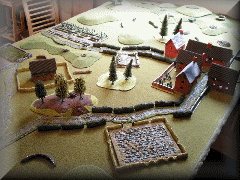 Brevet Colonel Jeff Bragg took
another swig of coffee, heavily laced with bourbon, and contemplated his
orders.
With only two companies of infantry, supported by
Shermans and M10 tank destroyers he was supposed to push through the Kraut
lines and rescue a bunch of Limey paratroops who were cut off on some hill
he could barely pick out through his binoculars.
Combat Command had suggested that he could do
without half his armour and an infantry platoon to support a move around the
Northern flank.
Screw that!
These were his tanks and his men and he wasn’t
gonna give them to some other jerk to probably lose for him.
No Siree! Brevet Colonel Jeff Bragg took
another swig of coffee, heavily laced with bourbon, and contemplated his
orders.
With only two companies of infantry, supported by
Shermans and M10 tank destroyers he was supposed to push through the Kraut
lines and rescue a bunch of Limey paratroops who were cut off on some hill
he could barely pick out through his binoculars.
Combat Command had suggested that he could do
without half his armour and an infantry platoon to support a move around the
Northern flank.
Screw that!
These were his tanks and his men and he wasn’t
gonna give them to some other jerk to probably lose for him.
No Siree!
Bragg growled out his instructions to
the orders group… they would do this the American way – straight up the
middle, all guns blazing.
Hauptmann Anders was tired and
disillusioned.
He knew that the war was lost. He knew that his
home in East Prussia was ground down under the Soviet heel. He knew that
scum like Kaestner would drag the Germany he loved down with them.
All
that remained was his own honour and the men who needed him.
He knew that he could never let either down…
The Heer had worked miracles in the
past, all that was needed was one more.
Facing the Americans to the west he deployed one
company in carefully prepared and camouflaged positions.
He checked them himself from a nearby rise –
invisible!
Against the paratroops who had seized the hill to the
east Anders decided that a swift and determined counterattack, as called for
by the doctrine, was preferable to a semi-defensive containment.
If it worked the battle would be won before the
Americans finished their coffee.
If it worked…
SS Standartenfuhrer “Franzi” Kaestner
paused to admire the sleeping form of the French girl in his bed.
He would miss her, whatever her name was.
No doubt she would make the usual fuss when she
found out the SS were leaving.
For a moment he contemplated taking her with him
but caught himself, and smiled.
There were plenty more like her, and if the SS
left and the French Resistance were none too gentle with her, well, she had
made her bed, now she must sleep in it.
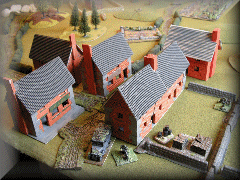 Franzi looked around the village.
It hadn’t been a bad billet, much better than
those bug-ridden hovels in the Ukraine that he had had to pull a lot of
strings to get out of.
This place had a nice bar, relatively friendly
locals and a comfortable HQ to work out of.
His HQ security company was under strength, with
only two platoons, but well armed with HMGs, mortars and panzerfausts.
Not far away was panzer support.
The HQ had worked on most of the plans for the
Korps and in addition to these valuable documents Franzi hadn’t been slow in
building up his own little store of valuables either… this war wouldn’t last
forever. Franzi looked around the village.
It hadn’t been a bad billet, much better than
those bug-ridden hovels in the Ukraine that he had had to pull a lot of
strings to get out of.
This place had a nice bar, relatively friendly
locals and a comfortable HQ to work out of.
His HQ security company was under strength, with
only two platoons, but well armed with HMGs, mortars and panzerfausts.
Not far away was panzer support.
The HQ had worked on most of the plans for the
Korps and in addition to these valuable documents Franzi hadn’t been slow in
building up his own little store of valuables either… this war wouldn’t last
forever.
But now it was time to go.
Reports were coming in of attacks all along the
front and the landing of paratroops on the hill behind the village could
only mean one thing – this place was important to the Allies.
If they wanted it, they could have it.
Kaestner saw no virtue in dying for a few
hectares of occupied France… Anders and his men were here to do that.
As soon as the trucks were loaded he would be
off.
Shame about the girl though…
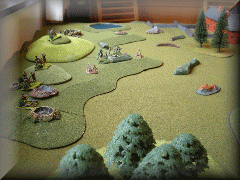 Captain Alter was late.
He had been miss-dropped, lost contact with his
entire company, and had spent much of the night hanging upside down in a
tree.
Not a good start to the offensive.
He trudged up the hill in broad daylight
expecting to see a scene of confusion before him.
Instead a grinning young Second
Lieutenant Hunt threw him a flamboyant salute and reported that the hill had
been taken with the loss of only two sections.
Two batteries of Jerry 120 mm mortars with
limited ammunition had been captured.
The men had been deployed in all round defensive
positions. Second Lieutenant
Hunt enquired if the Captain wished to change anything? Captain Alter was late.
He had been miss-dropped, lost contact with his
entire company, and had spent much of the night hanging upside down in a
tree.
Not a good start to the offensive.
He trudged up the hill in broad daylight
expecting to see a scene of confusion before him.
Instead a grinning young Second
Lieutenant Hunt threw him a flamboyant salute and reported that the hill had
been taken with the loss of only two sections.
Two batteries of Jerry 120 mm mortars with
limited ammunition had been captured.
The men had been deployed in all round defensive
positions. Second Lieutenant
Hunt enquired if the Captain wished to change anything?
Alter looked down the hill to the
village to the South East, plenty of Jerry activity there.
To the far North West he could see the dust of a
significant engagement being fought a fair way away, and closer in Jerry
seemed to be massing for a counter-attack on the hill.
Alter scanned his binoculars along the western
horizon.
He couldn’t see anything… he couldn’t see anything and
yet it was from here that salvation should come.
He had to hold until relieved – and relief
should come from the west.
He looked at his watch.
It was exactly 0930 hrs when the German mortar
shells started to fall.
The initial German mortar stonk on
the hill only used half their available weapons and soon petered out into a
desultory machine gun fusillade, allowing the Allies to regain the
initiative.
Alter leapt at his chance and brought the fire of
his own company mortar and two captured German mortars down on Ander’s
massed company which suffered heavy losses and hunkered down.
Only one platoon of the company was to cross
their start line throughout the battle and this was soon pinned by the
para’s HMG fire.
To the West Bragg attacked on a broad
front with both leg companies up, supported by half the armour each.
The initial assault was held up in the centre by
Germans well hidden around a barn.
Using smoke and the armour these were
neutralised but, when an American platoon moved to take them in the flank,
the Americans were in turn caught in the flank by more Germans firing from a
nearby wood.
Intelligent use of smoke and armour eventually
extricated these men and eventually the Americans took the now blazing barn
having suffered their only serious infantry casualties of the day.
Kaestner had started loading his HQ
paraphernalia and valuables as soon as the battle started.
There are disputed versions of what happened
next but it was either because Franzi was paying particular attention to the
loading of his more fragile plunder; or because the French girl (who may
have been working for the SOE), was paying particular attention to Franzi,
that he delayed calling for his panzer support for some time.
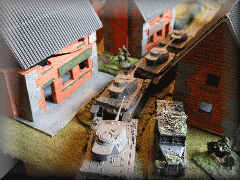 When the column of Pz IVs finally did
arrive it halted outside Kaestner’s HQ for orders, leaving the flank of one
tank perfectly exposed to the 3” gun of an American M10 Tank Destroyer off
to the West.
It was the perfect shot for a well-trained,
fresh and confident tank killer crew – and they blew it.
The AP shot fell short, ricocheted off the
cobbles and embedded itself in the wall of the Café Rene where, for years
afterwards it would be proudly shown to visiting American, British and the
occasional German veteran.
The Panzers didn’t give the M10 a second chance
and quickly popped smoke grenades to cover the front and flank of the
column.
However the near miss perhaps had some effect, as
Kaestner’s respect for the American armour was enhanced and, rather than
sending the panzers out to duel with them, he set them about the apparently
easier task of clearing the British paratroops from the hill. When the column of Pz IVs finally did
arrive it halted outside Kaestner’s HQ for orders, leaving the flank of one
tank perfectly exposed to the 3” gun of an American M10 Tank Destroyer off
to the West.
It was the perfect shot for a well-trained,
fresh and confident tank killer crew – and they blew it.
The AP shot fell short, ricocheted off the
cobbles and embedded itself in the wall of the Café Rene where, for years
afterwards it would be proudly shown to visiting American, British and the
occasional German veteran.
The Panzers didn’t give the M10 a second chance
and quickly popped smoke grenades to cover the front and flank of the
column.
However the near miss perhaps had some effect, as
Kaestner’s respect for the American armour was enhanced and, rather than
sending the panzers out to duel with them, he set them about the apparently
easier task of clearing the British paratroops from the hill.
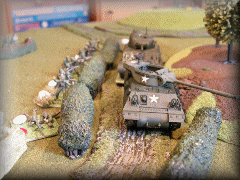 Bragg had placed great store in his
artillery dominating the battlefield and neutralising opposition.
This was not to be.
Although his Forward Observer was well sited,
and although the gunners worked like demons, serving their guns through
eleven
consecutive fire missions, they had almost no effect.
It was all very trying at the time but later on,
when the battle was over and humour could break the tension, the wags
suggested that the whole village had been rebuilt 50 metres off its position
on the grid.
Only the Observer did not find this funny. Bragg had placed great store in his
artillery dominating the battlefield and neutralising opposition.
This was not to be.
Although his Forward Observer was well sited,
and although the gunners worked like demons, serving their guns through
eleven
consecutive fire missions, they had almost no effect.
It was all very trying at the time but later on,
when the battle was over and humour could break the tension, the wags
suggested that the whole village had been rebuilt 50 metres off its position
on the grid.
Only the Observer did not find this funny.
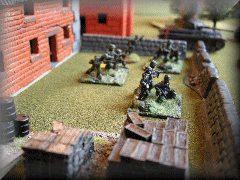 With the hill under fire from the
panzers as well as the SS in the town and the Heer company; and with his
captured mortars running short of ammunition, things were beginning to look
a bit grim for Alter and his men.
So far the German panzerfausts had had no effect
on the Allied armour but it remained to be seen what the determined, and
slightly annoyed British paras could do with their PIATs.
Private Grimshaw’s first shot with the woefully
inaccurate weapon hit one of the Pz IVs at extreme range.
The paras erupted into cheers, only to turn to
stunned silence when they realised that the hollow charge had gone off on
one of the tanks protuberances and had failed to penetrate!
Alter’s dismay was palpable but the panzers
ventured no closer – they didn’t have to, their 75 mm guns and HMGs could
kill paras from way beyond the PIAT’s effective range.
Gradually the tank guns and mortars searched out
the paras’ positions one-by-one and Alter’s position became more and more
desperate. With the hill under fire from the
panzers as well as the SS in the town and the Heer company; and with his
captured mortars running short of ammunition, things were beginning to look
a bit grim for Alter and his men.
So far the German panzerfausts had had no effect
on the Allied armour but it remained to be seen what the determined, and
slightly annoyed British paras could do with their PIATs.
Private Grimshaw’s first shot with the woefully
inaccurate weapon hit one of the Pz IVs at extreme range.
The paras erupted into cheers, only to turn to
stunned silence when they realised that the hollow charge had gone off on
one of the tanks protuberances and had failed to penetrate!
Alter’s dismay was palpable but the panzers
ventured no closer – they didn’t have to, their 75 mm guns and HMGs could
kill paras from way beyond the PIAT’s effective range.
Gradually the tank guns and mortars searched out
the paras’ positions one-by-one and Alter’s position became more and more
desperate.
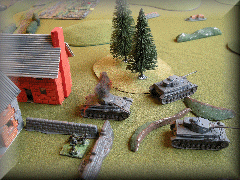 Bragg could hear the sound of
armour’s probably trying to find a way onto his front from the North.
Was it Allied or was it Kraut?
Damned if Bragg knew!
If it was Allied they’d turn up when ready, if
it was German there was no point in annoying it, so Bragg returned to the
problem at hand – how to break through the German position? Bragg could hear the sound of
armour’s probably trying to find a way onto his front from the North.
Was it Allied or was it Kraut?
Damned if Bragg knew!
If it was Allied they’d turn up when ready, if
it was German there was no point in annoying it, so Bragg returned to the
problem at hand – how to break through the German position?
Through his binoculars Bragg could
see that the British were taking a pounding.
On his left the American advance had stalled
upon coming to a series of walled enclosures, any one of which could hide an
ambush.
No time for careful reconnaissance by fire now,
desperate times call for desperate measures.
Bragg waved his point platoon on.
As the Americans crossed the first wall the
second wall to their front was suddenly crowned by an entire German platoon.
The Americans were caught in the perfect killing
zone with a wall behind them and Germans in cover to the front – it was like
a firing squad.
The Germans let loose with a sustained fusillade
– which mostly went high and wide.
As the MG 42s went quiet for a change of
over-heated barrels and more belts of ammo, the amazed GIs looked around to
see that their losses had been negligible.
With two of the German Squads short of ammo the
third held their fire waiting for the American infantry to close.
But Bragg was not a man to take a knife to a
gunfight.
He had been lucky not to lose a platoon and now had no
intention of taking the Germans on in a fair fight.
He called up two Shermans which poured HE and
HMG into the German line and then called up a
fresh platoon to winkle the now shocked and suppressed Heer out.
All in all it was a classic display of combined
arms tactics and it opened up the entire northern flank.
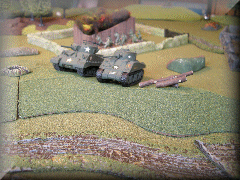 Bragg exploited quickly and the
advancing Shermans were soon hull down on a ridge in a perfect position to
take on the rear of Ander’s infantry company, still stalled below the hill,
as well as make good practice against the Panzers attacking out of the town.
This breakthrough had also left the last of
Ander’s concealed platoons in the wood near the barn surrounded on three
sides – their days were numbered too. Bragg exploited quickly and the
advancing Shermans were soon hull down on a ridge in a perfect position to
take on the rear of Ander’s infantry company, still stalled below the hill,
as well as make good practice against the Panzers attacking out of the town.
This breakthrough had also left the last of
Ander’s concealed platoons in the wood near the barn surrounded on three
sides – their days were numbered too.
With his transport vehicles safely
away Kaestner set the torch to his headquarters.
His platoon facing the hill had had a good
hour’s target practice at no risk to themselves.
But on the other side of town the platoon facing
the Americans was coming under a constant, if ineffective, but still
annoying, artillery barrage; and rather more deadly direct AFV fire.
They could not be extricated, but Kaestner and
the rest of his men had a clear route south and he, for one, intended to use
it.
Shielded from Kaestner’s pinned
platoon by other buildings, the lead American infantry platoon approached
the Café Rene on the south side of the town.
Their weapons were cocked and every sense on
edge as they approached the bar.
Suddenly the doors and windows crashed open –
and jubilant French civilians ran out to greet their liberators.
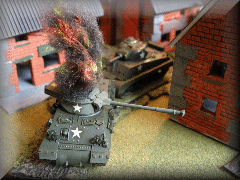 With the infantry having cleared the
way Bragg sent his armour into the village to cut of the German retreat.
The northern road out of the village was already
blocked by a smouldering panzer, and as the lead M10 crept around the
burning HQ it was exposed against the smoke and flames and a snap shot from
a Pz IV in the field beyond brewed it up – neatly blocking the Sherman
behind it. With the infantry having cleared the
way Bragg sent his armour into the village to cut of the German retreat.
The northern road out of the village was already
blocked by a smouldering panzer, and as the lead M10 crept around the
burning HQ it was exposed against the smoke and flames and a snap shot from
a Pz IV in the field beyond brewed it up – neatly blocking the Sherman
behind it.
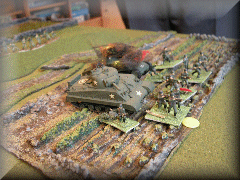 As Kaestner’s SS and the remaining
panzers escaped to south Bragg urged his armour in the north on to complete
the destruction of Ander’s company in the open.
Flushed with victory the Shermans advanced
towards the rear of the Heer company – it would be a massacre.
But one German infantryman kept his nerve and
waited with his panzerfaust until the tanks were at point blank range:
the lead Sherman shuddered and then exploded as
the hollow charge ripped through it.
The American advance came to a shocked halt,
allowing Anders and what was left of his men to escape to the north and
east. As Kaestner’s SS and the remaining
panzers escaped to south Bragg urged his armour in the north on to complete
the destruction of Ander’s company in the open.
Flushed with victory the Shermans advanced
towards the rear of the Heer company – it would be a massacre.
But one German infantryman kept his nerve and
waited with his panzerfaust until the tanks were at point blank range:
the lead Sherman shuddered and then exploded as
the hollow charge ripped through it.
The American advance came to a shocked halt,
allowing Anders and what was left of his men to escape to the north and
east.
Captain Alter stared around him.
Almost two thirds of his men were wounded, dead
or missing.
Below him he could see advancing Americans,
retreating Germans, celebrating Frenchman, exploding tanks and burning
buildings.
He looked at his watch..
It was exactly 1040 hrs when the firing stopped.
He had held until relieved…
- xxx -
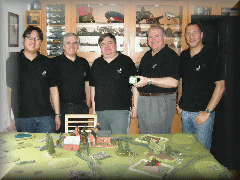 Well that was our game.
The scenario was provided by Lloyd, the
interpretation by me.
Nick “Alter” was late but had spent the night in
a nightclub rather than upside-down in a tree.
Andrzej “Anders” was tired and hung-over, if not
tired and disillusioned.
Frankie “Kaestner” does have the attention span
of a gnat which is why he forgot to summon his panzers until prompted; and
Jeff “Bragg” did play a blinder of a game even though he forgot to call in
his flank support. Well that was our game.
The scenario was provided by Lloyd, the
interpretation by me.
Nick “Alter” was late but had spent the night in
a nightclub rather than upside-down in a tree.
Andrzej “Anders” was tired and hung-over, if not
tired and disillusioned.
Frankie “Kaestner” does have the attention span
of a gnat which is why he forgot to summon his panzers until prompted; and
Jeff “Bragg” did play a blinder of a game even though he forgot to call in
his flank support.
All these events were related to the
rest of WCFD as follows:
-
The British tanks off the
northern flank were not used in Game 1 (NZ), so they were potentially
available for our game.
-
In Game 2 (NZ) a route was found
around the northern flank for those tanks to use.
-
If the Allies had captured the HQ
intact that would have revealed the German dispositions in Game 16
(Canada).
-
Frankie’s withdrawing tanks lived
to blunder into a commando raid on an airfield in Game 6 (UK) where
Kaestner was killed.
(Or so Lloyd believes, but conspiracy
theorists note that a charred body is not definitive identification
evidence, that none of Kaestner’s ill-gotten gains were ever recovered,
and that he bore a marked similarity to a Hong Kong banker who seemed to
have independent means of support and who in his later years, was
instrumental in the development of credit default swaps.)
Had Kaestner survived with the operational
plans intact he would have played an important role in Game 16.
-
In Game 9 (UK) the tanks that
Jeff had not called upon reinforced the Allied attack and played a
decisive role.
Jeff is now taking credit for this too.
-
The hill that Nick held was used
to set up artillery to support the Allied attack in Game 13 (Canada).
For more details on the WCFD battles
see
here.
Lloyd told me that his scenario notes ran to 183
pages and he now declares that he will not run a WCFD again.
Well, maybe, maybe not, but he did give a lot of
fun to 50 wargamers around the world and WCFD was a great success.
Well done that man…
back
to world war II |